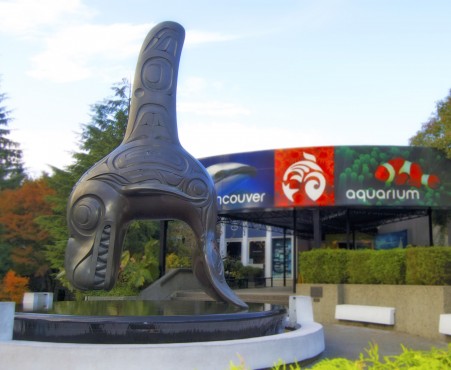
While Marineland continues to hold captive belugas, the Vancouver Aquarium has officially ended the import of cetaceans (whales dolphins, and porpoises), in response to a growing change in public opinion regarding cetacean captivity. Photo by Kristi Wilson via Vancouver Aquarium
On March 9, 2017, the Vancouver Park Board voted unanimously to end the captive beluga breeding program at the Vancouver Aquarium. The vote brings an end to the importation of cetaceans (whales, dolphins, and porpoises) into the facility, dissolving their whale display and discontinuing their beluga breeding program.
The decision is to be enacted by May 15 of this year.
Currently, the aquarium houses Helen, Daisy, and Chester: a pacific white-sided dolphin, a harbor porpoise, and a rescued false killer whale, respectively. Following the decision, where will they go? General manager Malcolm Bromley has stated that given the “optional language in the bylaw,” the aquarium will be looking at “either keeping the cetaceans until the end of their natural life, or removing them from the park.”
The ban comes just a few months after the aquarium’s decision to invest $20 million into expanding their beluga enclosures. The plan, according to Nightingale, was to shuffle some whales around and end captivity by 2029 — which makes one wonder why the expansion was considered a good idea in the first place.
The captivity ban creates a strange juxtaposition between aquariums in Vancouver and Ontario. On one hand, Vancouver Park Board chair Michael Wiebe stated that the decision was the “will of Vancouverites”: back in November, the situation reached a “tipping point” when their two remaining belugas, Aurora and her calf Qila, died unexpectedly within a week of each other. While no official consensus has been released on their cause of death, park and city officials were drowned in online petitions and thousands of public submissions against the captivity of whales (cue abundant metaphors about living in bathtubs and pleas for the humane treatment of these sentient beings. Think of the children!)
On the other hand, Marineland Ontario continues to hold around 45 belugas with no impending repercussions.
The reason Marineland Ontario is able to hold whales in captivity while the Vancouver Aquarium is not comes down to who owns the respective land. In Vancouver, the Park Board mandates the use of Stanley Park, giving it exclusive jurisdiction over the federal land on which the park operates. This ownership was essential in overruling current federal legislation and enforcing the cetacean ban, because having exclusive jurisdiction over the park (and the operations within it, including the Vancouver Aquarium) meant that the Park Board was able to overrule the nasty legislation Canada currently has in place.
Marineland Ontario, on the other hand, operates according to the Convention on International Trade of Endangered Species (CITES), which states that Canada is still allowed to import and trade cetaceans for “educational, scientific, and breeding purposes.” Because of their set-up, Marineland Ontario is not in a position to overrule this legislation in favour of public opinion, as we saw in Vancouver.
With this in mind, Canadians should consider the Vancouver captivity ban a small win in a larger battle. As long as CITES is in place, our country is still actively involved in the captivity debate, which seems fishy, considering the decision in Vancouver hints at growing change. It’s high time Canada recognized the need to ditch our current agreement and ban the whale trade nation-wide, as captivity is clearly not universally supported any longer.
The bottom line is that if Marineland Ontario continues to operate, the Vancouver Parks Board decision to end captivity is but a drop in the ocean of larger problems. In 2015, Marineland Ontario banned orca captivity, which was great news after the tragedy of 17 orca deaths and three miscarriages since their opening in 1973. Not only that, but their track record isn’t any better for belugas; they’re currently winning the race for the most beluga deaths in North America.
If Canadians want to end cetacean captivity once and for all (which seems like a no-brainer at this point, given the fact that we demonstrably suck at keeping them healthy and alive), Canadians must push to amend the current CITES ruling. In fact, there is currently a bill backed by Liberal senator Wilfred Moore to end the captivity of cetaceans in Canada, but there is no word as to if or when it will reach royal assent.







